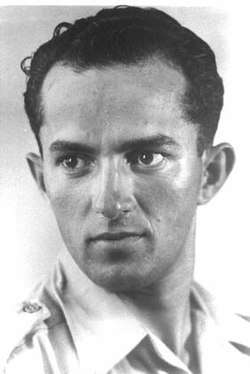Arieh Atzmoni
Arieh Atzmoni (Hebrew: אריה עצמוני; 1926–2005) was an Israeli soldier rewarded with the Hero of Israel.[1]
Arieh Atzmoni | |
|---|---|
 | |
| Born | 1926 Uzhhorod, Czechoslovakia |
| Died | March 30, 2005 (Aged 79) |
| Allegiance | |
| Battles/wars | |
| Awards | |
Biography
Atzmoni was born Leib Markowicz in Uzhhorod (then in Hungary, now in Ukraine). During World War II, when he was 13, he left his parents home and lived alone in Budapest. During the Holocaust, his mother and two younger sisters were murdered, while his father, brother and older sister were saved.[2] Later, he was taken to a labor camp in Yugoslavia and worked in copper mining until he was liberated by local partisans, whom he joined in fighting the Germans until his immigration to Palestine in 1944 at age 18.
He was held in the Atlit detainee camp before joining the Jewish Brigade and serving in Egypt and Italy. At the end of his service in Europe, he joined the Jewish Settlement Police and dealt with Naharayim. Following an Arab Legion attack, he retreated with the guards and reached the nearby base of the 12th Battalion of the Golani Brigade. He joined the ranks of the brigade and after a sergeant course was stationed as a company sergeant and served in this position during the 1948 Arab–Israeli War. In September 1948 he cleared a fire-focused ammunition box during battle and received a commendation from the brigade commander.[3] For this he was awarded the Hero of Israel:
On January 4, 1949, in the battle for the cemetery in Rafah, our artillery car was stopped in the field and the entire sector was concealed in front of our cannon position. The enemy, which attacked tanks and armored vehicles accompanied by infantry, rained fire on the outpost and prevented any action to remove the car from the area. Lt. Col. Arieh Otzmany, whose job was to bring ammunition and digging equipment to the outpost, jumped at the car, managed to start it, and drove it from the front to the rear, enabling our anti-tank cannon to launch an operation that resulted in the use of nine tanks and other enemy vehicles.
He died in 2005 and was buried in Haifa at a military ceremony. He was married and the father of a son and daughter.
References
- "מלחמת העצמאות". IDF Website.
- "עצמוני - "חיים שכאלה"". Atzmony.
- Goldstein, Dov. ""גיבור ישראל" שוב לבש מדים". Maariv.